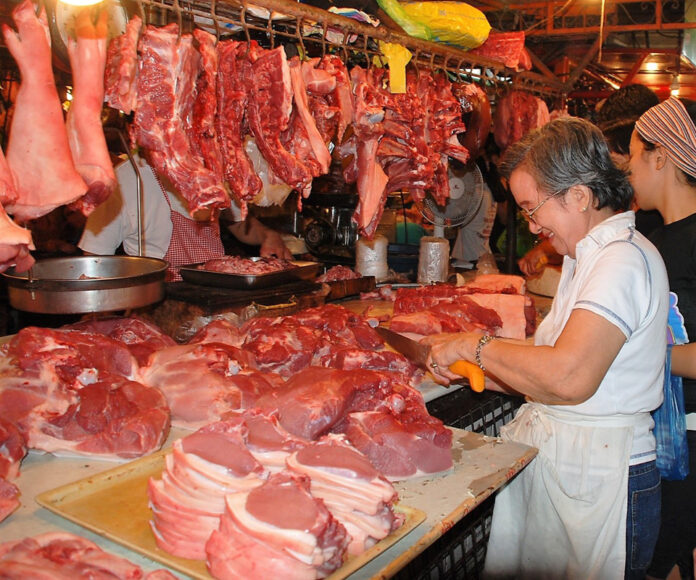-
President Rodrigo Duterte has approved “in principle” an increase in minimum access volume for pork, allowing more imports to temper supply and price issues
-
The Department of Agriculture earlier proposed increasing the MAV from 54,210 metric tons to 162,000 metric tons
-
DA will provide hog raisers a transport subsidy of P21 per kilo for live pork or pork in a box from Mindanao to Metro Manila; P15 per kilo from Visayas, Bicol, MIMAROPA, and extreme North Luzon; and P10 per kilo from CALABARZON and Central Luzon
-
DA is also planning to fund fuel requirements of trucks handling pork shipments to Metro Manila
President Rodrigo Duterte has approved “in principle” an increase in minimum access volume (MAV) for pork to pave the way for more imports of the commodity and help address supply and price issues in the Philippines, according to Agriculture Secretary William Dar.
The MAV refers to the volume of quantity of a specific agricultural commodity that may be imported with a lower tariff.
“In principle, the President has already approved [the] MAV Plus. Nasa proseso lang po tayo para wala namang masabi na walang consultation ang nagawa [We are now processing so that no one can say no consultation was done],” Dar said in a press briefing on February 8.
Cabinet Secretary Carlo Alexis Nograles also earlier said Duterte had allowed additional pork imports on February 3 as recommended by the Department of Agriculture (DA).
Nograles said the current MAV is 54,210 metric tons, but DA projects annual demand for pork supply reaching 1.618 million metric tons. DA has proposed increasing the MAV to 162,000 metric tons.
The African swine fever (ASF) outbreak began in 2019 and has disrupted operations of hog growers in Luzon, prompting the need for supply to be shipped in from Visayas and Mindanao.
About 95% of the pork supply in the Philippines is locally sourced, and while the ASF virus does not pose any health risks to humans, there is no known vaccine to prevent it from spreading to the local livestock and destroying the industry.
The Philippine government recently placed a 60-day price cap on pork and chicken products in Metro Manila to contain rising prices.
The DA has placed the blame for the high prices on traders and wholesalers who allegedly unreasonably jacked up the prices of kasim/pigue and liempo. The prices of these products had ranged from P360 to P400 per kilogram (kg) in December through January 2021, while farmgate prices of hogs had remained at P130 to P210/kg.
The National Economic and Development Authority (NEDA) Board Committee on Tariff and Related Matters has endorsed the proposed increase in MAV for pork and the temporary decrease in the most favored nation tariff rates of pork and rice.
Acting Socio-Economic Planning Secretary Karl Kendrick Chua, in a statement, said allowing more importation of key agricultural products including pork, while adhering to strict safety protocols to prevent the entry of contaminated products, will help as an interim solution to augment supply and manage inflation.
The Philippine Association of Meat Processors, Inc. earlier suggested zero tariff on an emergency basis for pork imports to help stabilize prices.
Samahang Industriya ng Agrikultura executive director Jayson Cainglet in a separate statement, however, said reducing tariff on pork imports would only help importers, not local hog growers.
Aside from the increase in MAV, NEDA supports DA’s implementation of special hog lanes or food highways to help boost supply, particularly to Luzon, and ensure unhampered delivery of agricultural products across the country.
“The unhampered movement of pork and other food items should result in lower prices at retail markets as traders and viajeros will no longer have any excuse about logistics and transport of agri-fishery products,” DA’s Dar earlier said.
Dar said on February 8 that 7 metric tons of live hogs or more than 260 pigs have arrived at Manila port from South Cotabato. He noted this is part of the Southern Cotabato Swine Producers Association’s commitment to send 10,000 hogs every week to Manila.
READ: Mindanao, Visayas hog farmers begin shipments to NCR
The department is assisting hog raisers by providing a transport subsidy of P21 per kilo for live pork or pork in a box that will be transferred from Mindanao to Metro Manila; P15 per kilo from Visayas, Bicol, MIMAROPA, and extreme North Luzon; and P10 per kilo from CALABARZON and Central Luzon.
Dar said they are also planning to fund the fuel requirements of trucks handling pork shipments to Metro Manila.





